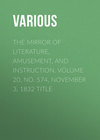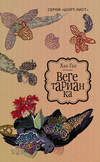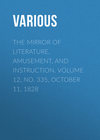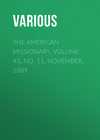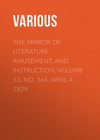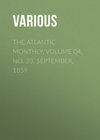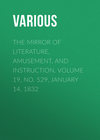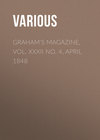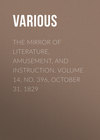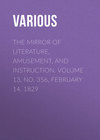Czytaj książkę: «The Mirror of Literature, Amusement, and Instruction. Volume 20, No. 574, November 3, 1832 Title», strona 6
THE NATURALIST
STOMACH OF THE OSTRICH
(To the Editor.)
Allow me to add, as a further illustration of the various and uncommon substances sometimes found in the stomach of the Ostrich, mentioned at page 262 of The Mirror, a fact which came under my own observation a few months since, on the occasion of dissecting two full-grown birds intended for the Surrey Zoological Gardens; but, which died while performing quarantine in Stangate Creek. On opening the maw, the stomach appeared distended to its fullest extent, and contained not less than half a bushel of various substances, besides a large quantity of the usual food in an undigested state, as, maize, barley, potatoes, onions, &c. There was nearly a peck of stones, most of which were as smooth and as highly polished as if they had passed through the hands of the lapidary; a sample of which I enclose you. Among this mass I found portions of tobacco-pipe, pieces of china and glass, brass buttons, copper coins, nails, and what most likely caused the death of the bird, a large quantity apparently of the head of a woollen mop, with portions of oakum, which from its size and quantity had proved too much for the bird to digest. It would appear, however, that many substances remain for years in the folds of the stomach, without injury; as on opening an Ostrich that died at Exeter 'Change after being some years in the possession of Mr. Cross, there were found besides a large quantity of rubbish, a handful of buttons, nails, marbles, stones, several keys, the brass handle of a door, a copper extinguisher, a sailor's knife, a butcher's hook, an iron comb, with penny pieces and coins to the amount of 3s. 4-1/2d.; and besides these various articles, there were several cowries, glass beads, such as are used for the purposes of traffic by the natives of the Barbary Coast, whence the bird was brought; and it never having had the opportunity of getting at such articles while in a state of confinement, little doubt remains of their having been swallowed by the bird while in its native country.
Another instance may be added of a full grown Ostrich, that was for some time in the possession of the Consul of Tripoli: during the period of the bird remaining at his house, a silver snuff box, of considerable size and value, was missing, and many were the persons suspected of having stolen it. The bird was after the lapse of a few months shipped as a present on board a frigate, and died during the voyage. The captain had it opened to ascertain if possible the cause of its death, when, in the stomach were found nails, keys, pieces of iron and copper, part of a lantern, and the identical snuffbox, although the chasing and sharp edges were worn completely smooth by the action of the stomach.
J. WARWICK.Surrey Zoological Gardens.
THE CONDOR
A pair of condors has lately been received from South America, for the Surrey Zoological Gardens. They are male and female, and are stated to be by far the largest specimens ever brought to this country, the male measuring nearly 14 feet across the wings, and in height upwards of three feet. They were brought from Chili, where they are sometimes met with at an elevation of 15,000 feet above the level of the sea. During the removal of the birds from the vessel, the male dropped one of his largest wing feathers, the quill of which measures an inch and a half in circumference.
THE GATHERER
The King.—(From the Spectator.)—Touching the business habits of the King, we have been favoured with the following statement, by a gentleman on whose honesty we can place perfect reliance, and who has ample opportunities of correct knowledge:—The attention of our present excellent Sovereign to public business is truly exemplary; and whilst he exceeds in regularity and despatch the habits of his late father,—whose conduct in this respect has seldom been properly appreciated,—his diligence forms a striking contrast to the supineness exhibited in the late reign, when days and weeks sometimes elapsed before the Royal signature could be obtained.
"The public learn from the Court Newsman that the King regularly comes to town once a week, to receive his ministers, and for the transaction of whatever business may be required; and these journeys are occasionally repeated within a few days of each other without the slightest regard for his personal convenience. Stronger proofs, however, exist of the King's devotion to the duties of his station. Every document submitted for his consideration and signature, is executed and returned to the proper office within twenty-four hours after he receives it, and generally within twelve hours. If a letter be addressed to Sir Herbert Taylor or to Sir Henry Wheatley, no matter how trifling may be its subject, it is certain of receiving an immediate and polite answer, the contents of which show that his Majesty must undoubtedly have been consulted; and if the request be refused, regret is expressed, and a satisfactory reason is usually assigned. Those only who are aware of the masses of papers submitted to the King, or of the innumerable subjects on which his pleasure is taken, can appreciate the promptness, courtesy, and decision which he displays; whilst in giving audiences, the extent of his information, and his business-like habits, excite equal surprise and satisfaction. When it is remembered that the King is above sixty-seven years of age, the labour which he undergoes seems extraordinary; and the admirable manner in which he executes his duties, is consequently entitled to still higher applause. His office is indeed no sinecure; and it would be well for the country if every department of the State, and every public officer imitated the example set them by the Sovereign.
"Before concluding this subject, justice demands that the manner in which Sir Herbert Taylor and Sir Henry Wheatley conduct the Royal correspondence, should not pass unnoticed; for, doubtless, a share of the praise which has been here expressed of their Master's decision and promptness, is due to them, and more especially for the extreme courtesy with which their letters are written."
We had before heard the fact of the King's extraordinary punctuality in signing papers, with this addition, that when they are more than ordinarily numerous, the Queen sits at the table with her Royal husband, lays the papers before him, and when signed, removes and arranges them, like a secretary.
Learned "Ladies."—Mr. Murphy used to relate the following story of Foote's, the heroines of which were the ladies Cheere, Fielding, and Hill, the last the widow of the celebrated Dr. Hill. He represented them as playing at "I love my love with a letter;" Lady Cheere began, and said, "I love my love with an N because he is a Night;" Lady Fielding followed with "I love my love with a G, because he is a Gustis;" and "I love my love with an F," said Lady Hill, "because he is a Fizishun." Such was the imputed orthography of these learned ladies.—Taylor's Records.
Den.—The names of places ending in den, as Biddenden, are perhaps not generally known to signify the situation to be in a valley, or near woods.
J.E.J.
Mock-heroics.—Cowper, in one of his letters to Joseph Hill, reminds his friend of the following mock-heroic line, written at one of their convivial meetings, called the Nonsense Club—
"To whom replied the Devil, yard-long-tail'd;"
And adds, "there never was anything more truly Grecian than that triple epithet; and were it possible to introduce it either into the Iliad or Odyssey, I should certainly steal it." This of course was written in jest; and had the translator been disposed to exemplify his own pleasantry, he might have found an opportunity in the well-known line of the sixth book of the Iliad—
Αιδεομας Θρωας αι Θρωαδας ελκεσιπεπλους
[Greek: Aideomas Trôas ai Trôadas elkesipeplous.]
I dread the Trojan ladies, yard-long-tail'd;
Of which Pope makes this sweeping periphrasis—
"And Troy's proud dames, whose garments sweep the ground."
E.B.I.
Burton Ale.—Many of our readers may recollect the dispute, about three years since, between the Burton Ale brewers and the Useful Knowledge Society, when the excellence of the ale was proved to be the result of the hard water of which it was manufactured flowing over a limestone rock. A chemist was dispatched to Burton, and the settlement of the matter assumed the importance of a discovery; though in the last century this fact was ingeniously explained by Dr. Darwin, in a letter to Mr. Pilkington, upon the supposition that some of the saccharine matter in the malt combines with the calcareous earth of hard waters, and forms a sort of mineral sugar, which, like true sugar, is convertible into spirits.
Read-y Wit.—A young man, in a large company, descanting very flippantly on a subject, his knowledge of which was evidently very superficial, the Duchess of Devonshire asked his name. "'Tis Scarlet," replied a gentleman who stood by. "That may be," said her Grace, "and yet he is not deep read."
CANTON.
Anti-free Trade.—An odd instance of the restrictive system occurred in the embassy from the emperor Otho to Nicephorus Phocas. The Greeks making a display of their dress, he told them that in Lombardy the common people wore as good clothes as they.—"How," they said, "can you procure them?"—"Through the Venetians and Amalfitan dealers," he replied, "who gain their subsistence by selling them to us." The foolish Greeks were very angry, and declared that any dealer presuming to export their fine clothes should be flogged.
